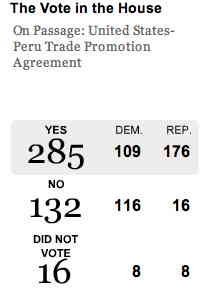Audio: Steve Weisman talks about trade. (mp3)
Full House Vote: US-Peru Trade Promotion Agreement
Trade Accord Causes a Split of Democrats
November 8, 2007, NY Times
By STEVEN R. WEISMAN
WASHINGTON, Nov. 8 — Has the Democratic Party gone soft on trade? Or has it opened a bitter internal split that could come back to haunt the party in the coming elections?
 (right) The Vote in the House
(right) The Vote in the House
Under the Bush administration, trade deals submitted for approval to Congress have generally been opposed by labor unions, environmental groups and left-of-center activists hostile to the forces of globalization. Democrats, as a result, have rarely given their approval.
But on Thursday, only a year after the Democrats regained control of Congress following a campaign rife with criticism of White House trade policies, nearly half the Democrats in the House broke with recent party orthodoxy and supported a trade deal with Peru that the administration hopes could lead to approval of significantly bigger and more important trade pacts in the future.
The Peru deal was approved by an overwhelming vote of 285 in favor to 132 against. But its most striking aspect was that 109 Democrats voted yes and 116 voted no, reopening the fissure that developed during the Clinton administration, when much of the party bucked President Bill Clinton as he pressed for the North American Free Trade Agreement and liberalizing trade with China.
To the surprise of many Democrats, the House Speaker, Nancy Pelosi, led her fellow party members to vote yes, and even she found it paradoxical. “Frankly, I have largely been on the other side of it than I am tonight,” Ms. Pelosi told colleagues Wednesday evening at the end of a rancorous debate, during which many Democrats accused her of betraying the party’s base.
The victory was sweet for the Bush administration, which points to the advantages of trade competition and wants to build up the export sector now that it is the strongest part of the economy. But many Democrats argue that lowering trade barriers has helped lose three million manufacturing jobs since 2000 and has resulted in stagnant wages.
Two developments have led to the Democratic rupture over Peru. First, Ms. Pelosi and other Democrats won concessions from the Bush administration to include protections for workers and for the environment in Peru, and by extension in trading-partner countries in future trade deals. With these attachments, Ms. Pelosi said the Peru deal was not perfect but still worthy.
Second, the Democrats are riding high politically and getting sizable campaign contributions from the sectors that are benefiting the most from the global economy. These include financial services firms, computer chip makers and other high-tech manufacturers, the entertainment industry and farmers dependent on selling to markets overseas.
A split among the Democratic presidential candidates, who receive support from unions but also from export-oriented industries, mirrors the disagreement in Congress. Senator Barack Obama of Illinois endorses the Peru deal, which is due to come before the Senate this year, while former Senator John Edwards of North Carolina opposes it as part of his populist anti-establishment campaign.
Senator Hillary Rodham Clinton of New York said on Thursday that she would vote for the Peru deal, but she has sent mixed signals on the overall issue. . She has asked, for example, for a review of the North America trade agreement negotiated by her husband, and she said she would vote against several coming trade accords.
Yet she is also surrounded by former officials from the Clinton administration who are ardently pro-trade, including former Treasury Secretary Robert E. Rubin.
The old Clinton hands, who argue that differences in education levels and advances in technology, not trade, are the main reason for wage stagnation or job losses, say they are confident that Senator Clinton’s instincts are in the pro-trade mold. These Democrats also call for more domestic spending on job training and preserving benefits for workers who do lose their jobs to imports.
“I think if a Democratic president comes in, Democrats will take a broader view of trade than Democrats can in Congress right now,” said Stuart E. Eizenstat, an under secretary of state for economic affairs under Mr. Clinton. “I would expect that a Democratic president will be able to win more trust from Democrats in trade, though maybe not from most of them.”
The accord with Peru would allow its exports into the United States duty-free and would eliminate duties on most industrial and farm exports from the United States to Peru.
Opponents of open trade say that because it was so bitter, the Peru vote may actually make future votes more difficult and the path of a future Democratic president more doubtful.
President Bush and his top aides hailed the approval of the Peru deal on Thursday and called on the same bipartisan cooperation to get behind pending deals on Panama, Colombia and South Korea.
It is far from clear, however, that the support for Peru will carry over to those deals or others.
The Panama deal is stalled, for example, because a top legislative leader there is wanted for murder of an American soldier. Democrats say they cannot support a deal with Colombia until it substantially reduces the killings of labor leaders and other dissidents there. The Korea deal is widely opposed because it does not provide access to American beef and because of fears by auto workers and some automakers that it would inundate the United States with Korean cars and trucks.
“The Peru vote has to be taken with a grain of salt,” said Clayton Yeutter, a former top trade envoy under President Ronald Reagan. “Of the four pending agreements, this one was the easiest for the leadership and the membership. It is not that big of an agreement, and they can use it to demonstrate some bona fides in favor of trade agreements.”